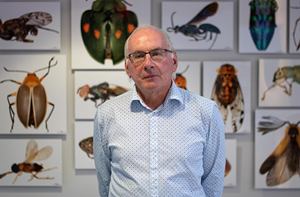International Barcode of Life will change the world
Dr. Paul Hebert receives Benjamin Franklin Medal for revolutionary work Dr. Paul Hebert
Scientific Director of the International Barcode of Life
Guelph, Ontario, Canada, Jan. 30, 2024 (GLOBE NEWSWIRE) -- Dr. Paul Hebert, the University of Guelph evolutionary biologist who pioneered the field of DNA barcoding, has won the Benjamin Franklin Medal for Earth and Environmental Sciences for 2024.
Known as “the father of DNA barcoding,” Hebert receives the medal for work pioneering the use of a “genetic barcode” capable of identifying species using a tiny segment of DNA, in the same way as barcodes discriminate products in the supermarket.
Capable of making species identification faster, more accurate, and less expensive than previous methods, the technology underpins a global effort to catalogue all life on Earth.
The Franklin Institute, an organization dedicated to promoting science and innovation, has awarded Benjamin Franklin medals since 1824 to world-changing scientists, engineers, inventors, and industrialists. Past laureates include Nikola Tesla, Pierre and Marie Curie, and Albert Einstein.
Hebert is the fourth Canadian to receive this honour.
“It’s thrilling to receive the 2024 Benjamin Franklin Medal in Earth and Environmental Science,” Hebert said. “Importantly, this award endorses a planetary research program led by Canada that is providing humanity with the knowledge required to better insulate biodiversity from global change.”
The technology Hebert conceived and developed has become a revolutionary method for helping scientists identify all species on the planet through the not-for-profit International Barcode of Life (iBOL) Consortium headquartered at the CBG.
With Hebert as scientific director, the consortium unites more than 1,000 researchers in 41 countries with a shared mission to build a global barcode reference library to illuminate biodiversity.
Through the use of DNA barcoding, researchers will register more species by 2030 than have been identified over the last 275 years through the traditional Linnaean taxonomic system.
“This award is a much-deserved recognition of Dr. Hebert’s completely transformative work. DNA barcoding technology has literally changed how we see and know life on Earth,” said Dr. Rene Van Acker, interim vice-president research.
Hebert is also the founder and CEO of the Centre for Biodiversity Genomics (CBG) within the College of Biological Science at U of G, which houses the world's largest DNA archive for biodiversity and a massive species image library.
As a professor in the Department of Integrative Biology and the Tier 1 Canada Research Chair in Molecular Biodiversity, Hebert has mentored 57 graduate students and 56 postdoctoral fellows throughout his career and more than 40 of them now hold faculty positions, reflecting his commitment to excellence and innovation.
“Dr. Hebert has provided many students, at both the undergraduate and graduate levels, with unparalleled hands-on opportunities at the forefront of biodiversity, ecology, and evolutionary science,” said Dr. Mazyar Fallah, dean of the College of Biological Science.
“Through the CBG, our students learn innovative analytical and technical skills, positioning them as trailblazers in biodiversity research to improve life and secure bright futures in science.”
A photo accompanying this announcement is available at https://www.globenewswire.com/NewsRoom/AttachmentNg/582a98fc-ae60-489d-bc22-f392927c767b
Contact: media@uoguelph.ca



